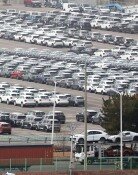Gov`t Plans Deregulation in Metropolitan Area
Gov`t Plans Deregulation in Metropolitan Area
Posted December. 20, 2008 02:07,
The Lee Myung-bak administration will adopt the so-called Two Track strategy for economic development, which eases regulations in the Seoul metropolitan area to encourage investment while focusing government support on provinces.
A government-business joint team, which will find and address concerns of businesses and problematic regulations, will start to work from the end of this month.
Knowledge Economy Minister Lee Yun-ho had his first meeting at the Westin Chosun Seoul with Federation of Korean Industries President Cho Seok-rae, Korea Chamber of Commerce and Industry Chairman Sohn Kyung-sik, Korea International Trade Association President Lee Hee-beom, Korea Employers Federation President Lee Soo-young and Korea Federation of Small and Medium Business Chairman Kim Gi-moon.
With respect to the question of deregulation, which businesses have demanded for a long time, Minister Lee said, The government plans to reasonably ease regulations in the metropolitan area and focus government assistance on provinces. He also said the 5+2 Economic Zone, under which the government divides the country into five large zones and two special zones for economic development, is part of the plan and that the administration is considering various measures.
He added, The central government used to work only in office, but will work harder to listen to the voices of people on the job. The creation of the joint team for addressing problems of businesses is an example.
The team will consist of the Knowledge Economy Ministry, economic organizations and private experts and will deal with major issues, such as labor-management relationship problems, foreign investment and regulations in the metropolitan area, by visiting related companies and regions.
A one-stop business center will be set up in the Knowledge Economy Ministry to address any inconveniences of businesses, from enrollment to feedback, at once.
At the meeting, the heads of economic organizations expressed their views on the current status along with other suggestions.
Japanese companies has not invested in Korea, not just because Koreas militant labor unions but because anti-Japanese sentiment among Koreans, said Cho, head of the Federation of the Korean Industries. With the start of the future-oriented Lee Myung-bak administration, it needs to increase Japanese investment in Korea dramatically.
Sohn complained about the difficulties of local economies, saying, There are 70 local business support centers in the local chapters throughout the country. We will deliver petitions and suggestions we collect to the Knowledge Economy Ministry.
Economic conditions are deteriorating. Trade deficit has been recorded for three months in a row, said Lee Hee-beom, president of the Korea International Trade Association. I am confident that we will be able to overcome the challenges wisely, as the new administration has rolled up the sleeves to revive the economy and as business leaders are also joining the effort.
Korea Employers Federation President Lee Soo-young said, Regulations are problematic, but the behavior of public servants (who deal with the regulations) are problematic as well. Correcting the practice is a way to change culture and a path toward advancement.
As was seen with the case of the halted operation of a molding company, rising commodity prices and the shortage of supply are worsening the conditions of small companies, said Korea Federation of Small and Medium Business Chairman Kim Gi-moon. The government and large companies should work hard for the co-existence of and cooperation with smaller businesses.
cha@donga.com







